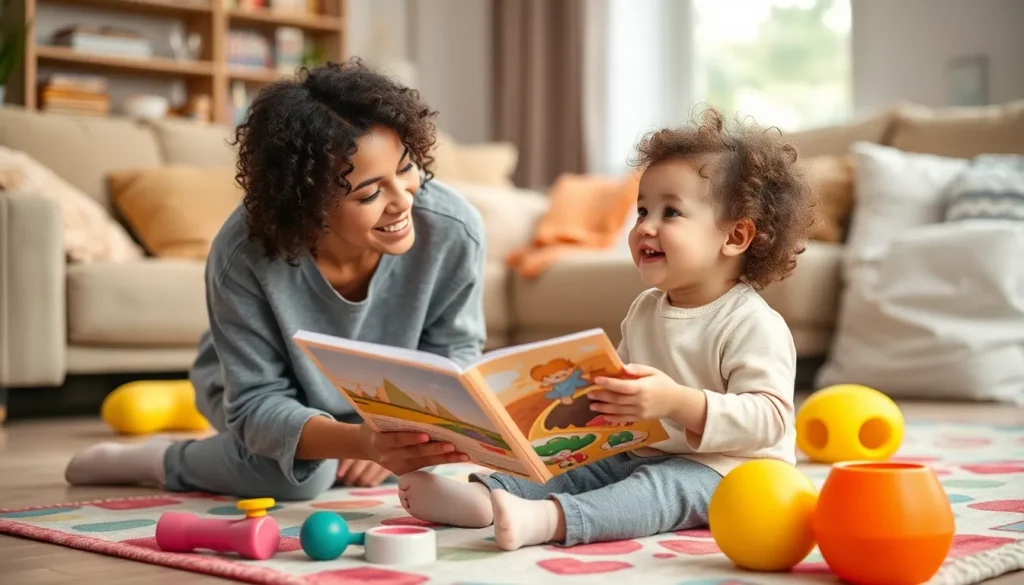Understanding toddler communication is vital for parents and caregivers navigating the early years of a child’s life. As toddlers begin to express their thoughts and feelings, they rely on a mix of verbal and non-verbal cues. This stage of development is crucial for building a strong foundation for future language skills and emotional intelligence.
Effective communication with toddlers not only aids in their language acquisition but also fosters a deeper bond between them and their caregivers. Recognizing the signs of their attempts to communicate can enhance interactions and create a supportive environment. By focusing on these early communication skills, caregivers can help toddlers thrive and develop confidence in expressing themselves.
Table of Contents
ToggleUnderstanding Toddler Communication
Understanding toddler communication is crucial for fostering a nurturing environment. Recognizing verbal and non-verbal cues enhances language skills and emotional intelligence.
The Importance of Early Communication Skills
Early communication skills form the foundation for lifelong language development. Engaging toddlers in conversations encourages vocabulary growth and understanding of social cues. Research shows that toddlers exposed to rich language environments display better language skills and academic success later. Responsive interactions promote confidence, allowing toddlers to express their needs and feelings effectively. Healthy communication strengthens the caregiver-child bond, facilitating emotional security and trust.
Stages of Communication Development
Communication development occurs in distinct stages:
- Cooing (0-3 months)
Infants coo and produce vowel sounds, laying the groundwork for later speech.
- Babbling (4-6 months)
Babbling includes repetitive consonant-vowel combinations, increasing sound exploration.
- Single Words (12 months)
Toddlers begin using single words like “mama” or “ball” to label objects and express needs.
- Two-Word Phrases (18-24 months)
Toddlers start combining words, forming simple phrases like “more juice” or “go park,” enhancing their expressive language.
- Complex Sentences (24+ months)
As toddlers develop, they construct complex sentences, expressing thoughts and ideas more elaborately. This stage is crucial for effective communication practices.
Understanding these stages enables caregivers to support toddlers’ communication skills actively. By encouraging interactions and providing opportunities for language use, caregivers help toddlers build essential skills for future success.
Ways Toddlers Communicate

Toddlers communicate through verbal and non-verbal methods to express their needs, feelings, and desires. Recognizing these communication forms helps caregivers foster strong connections and support language development.
Verbal Communication
Verbal communication in toddlers begins with cooing, progressing to babbling, and later evolving into single words and phrases. Words like “mama,” “dada,” and basic nouns represent early milestones. As toddlers reach ages 2 to 3, they typically form two-word phrases such as “more juice” or “big truck.” By 3 years, many toddlers can construct simple sentences, utilizing vocabulary from their daily interactions. Engaging toddlers in frequent conversations enhances their language skills, leading to better vocabulary and comprehension.
Non-Verbal Communication
Non-verbal communication includes gestures, facial expressions, and body language. Toddlers often use pointing to indicate objects of interest or to express needs. They might clap their hands to show excitement or shake their heads to signify “no.” Eye contact is vital for understanding emotional cues; it conveys interest and attentiveness. Additionally, physical proximity can indicate comfort or the desire for connection. Caregivers who respond to non-verbal cues reinforce toddlers’ attempts to communicate and promote confidence in expressing themselves.
Encouraging Effective Communication
Fostering effective communication in toddlers involves engaging in activities that stimulate language development and listening skills. Caregivers can adopt various strategies to enhance toddlers’ ability to express themselves and understand others.
Interactive Play
Interactive play significantly boosts communication skills in toddlers. Engaging in activities like role-playing or using dolls encourages them to exchange ideas and narrate stories, promoting vocabulary expansion. Playing games that require turn-taking enhances listening and patience, crucial components of effective communication. Caregivers can facilitate these activities by asking open-ended questions, guiding conversations, and modeling language usage during play. This active participation nurtures both verbal skills and emotional connections.
Reading Together
Reading together serves as a vital method for promoting communication. Sharing books with toddlers introduces them to new vocabulary while sparking curiosity about language and storytelling. Caregivers can choose interactive books that incorporate questions or prompts to keep toddlers engaged. Discussing illustrations and asking questions about the story encourages toddlers to express their thoughts. Regular reading experiences help build recognition of words, improve comprehension, and lay the groundwork for future literacy skills essential for effective communication.
Common Challenges in Toddler Communication
Understanding toddler communication poses several challenges for parents and caregivers. Identifying these common difficulties can help in facilitating effective communication and supporting developmental progress.
Speech Delays
Speech delays manifest when toddlers do not meet expected language milestones, such as producing words or phrases by specific ages. According to the American Speech-Language-Hearing Association, approximately 10% of children experience speech delays. Factors contributing to these delays include hearing impairments, developmental disorders, and environmental influences. Early intervention, through speech therapy and tailored activities, significantly improves communication skills. Consistent engagement in conversations, reading aloud, and encouraging imitation of sounds can also aid in overcoming speech delays.
Behavioral Issues
Behavioral issues may arise as a result of frustration from communication difficulties. Toddlers often exhibit tantrums or aggressive behaviors when unable to express their needs or feelings effectively. These behaviors can stem from a lack of vocabulary or comprehension of social cues. Strategies for addressing behavioral issues include teaching alternative forms of communication, such as gestures or sign language, and providing consistent routines to create a sense of security. Using positive reinforcement encourages toddlers to use language instead of frustration, fostering a more effective communication environment.
Tips for Parents and Caregivers
Parents and caregivers play a crucial role in fostering effective communication skills in toddlers. Implementing specific strategies can enhance a toddler’s ability to express themselves and understand others.
Creating a Supportive Environment
Creating a supportive environment involves establishing a routine that encourages regular communication. Designating specific times for conversations, such as during mealtimes or play sessions, promotes verbal interaction. Using a calm tone and maintaining eye contact establishes trust and makes toddlers feel valued. Additionally, offering choices when discussing daily activities empowers toddlers and encourages them to express their preferences. Incorporating various forms of communication, including gestures and expressions, reinforces their understanding and confidence in conveying thoughts.
Utilizing Resources and Tools
Utilizing resources and tools can enhance learning and communication skills. Incorporating educational toys, such as picture books and interactive games, stimulates language development. Listening to audiobooks or songs designed for toddlers familiarizes them with different phonetics and vocabulary. Accessing apps specifically designed for language learning offers engaging activities that promote vocabulary growth. Connecting with local libraries or community centers often provides access to workshops and resources that support language development. Engaging with these tools creates a rich language environment for toddlers to thrive.
Understanding toddler communication is vital for nurturing their growth and development. By recognizing both verbal and non-verbal cues, caregivers can foster a supportive environment that encourages toddlers to express themselves confidently. Engaging in meaningful conversations and interactive play not only enhances language skills but also strengthens the emotional bond between toddlers and their caregivers.
Addressing communication challenges early on ensures that toddlers receive the support they need. With the right strategies and resources, caregivers can significantly impact their child’s language development journey. By prioritizing effective communication, parents and caregivers lay the foundation for lifelong learning and success.



